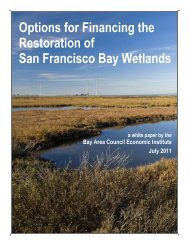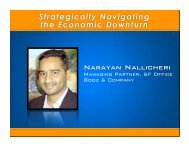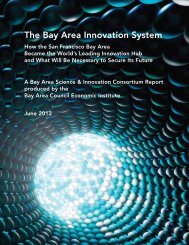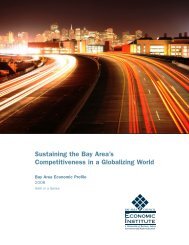Ties That Bind - Bay Area Council Economic Institute
Ties That Bind - Bay Area Council Economic Institute
Ties That Bind - Bay Area Council Economic Institute
Create successful ePaper yourself
Turn your PDF publications into a flip-book with our unique Google optimized e-Paper software.
108<br />
<strong>Ties</strong> <strong>That</strong> <strong>Bind</strong><br />
IPO—particularly in cases involving acquisitions of well-known Chinese trademarks or brands.<br />
To some degree these actions appear to have been stimulated by the recent surge in foreign<br />
merger and acquisition activity. The new moves suggest growing nationalism on the government’s<br />
part, and a readiness to intervene to protect local companies, support the development of<br />
national brands, and limit the market power and influence of foreign companies.<br />
%D\ $UHD &RQQH�WLRQV<br />
The above factors taken together suggest a continued advantage for <strong>Bay</strong> <strong>Area</strong> investors already<br />
established in the China market. While venture capital and private equity account for only a small<br />
part of the $50–70 billion in foreign investment being poured into China each year (the greater<br />
part being investment in new facilities), they are playing a particularly important role in China’s<br />
growing entrepreneurial community and in technology and internet plays in particular.<br />
In newer service and tech sectors, particularly wireless communications and the internet, Chinese<br />
companies—and <strong>Bay</strong> <strong>Area</strong> startups formed by Chinese science, engineering and business school<br />
graduates—bring to the table distinct technology solutions geared to the Chinese market.<br />
Converting Entrepreneurs to Managers<br />
The challenge up to now, fund managers agree, has been developing the management capability<br />
to run a hybrid global enterprise that blends Silicon Valley freedom and innovation, Chinese cost<br />
savings and discipline, and global business sophistication.<br />
Min Zhu, a Stanford doctoral graduate and founder of web conferencing, presentations and<br />
training firm WebEx, is now a manager of the New Enterprise Associates (NEA) $100 million<br />
Northern Light incubator fund and an officer of the Hua Yuan Science and Technology<br />
Association’s Beijing Chapter. Northern Light plans to spend an average of $10 million each on<br />
10 startups in China and California—in sectors ranging from internet-based insurance to radiology/oncology<br />
scanning devices to solar panels. But the focus will be as much on building management<br />
capability as with bringing new technology to market. Zhu says China affords entrepreneurs<br />
and investors an opportunity to re-create successful Western enterprise and industry models<br />
from the ground up , at a fraction of the cost, leaving room for experimentation and error.<br />
Acorn Campus Ventures, a startup incubator launched by mainland and Taiwanese engineers,<br />
provides venture funding and mentorship plus office space and shared research facilities in<br />
Cupertino and Shanghai. Acorn looks for proposals involving “paradigm shift and disruptive<br />
technologies” with strong growth potential, high entry barriers and viable intellectual property,<br />
but also a strong team and solid core competencies. Its focus is in communications, wireless,<br />
semiconductor, photonics, internet and life sciences.<br />
Management in China can be a balancing act. Investment banker Ken Tsang, co-founder and<br />
managing director at Hina Group, says culture is the biggest issue in an M&A transaction, or in<br />
restructuring a company for a stock exchange listing. Chinese managers and workers are often








